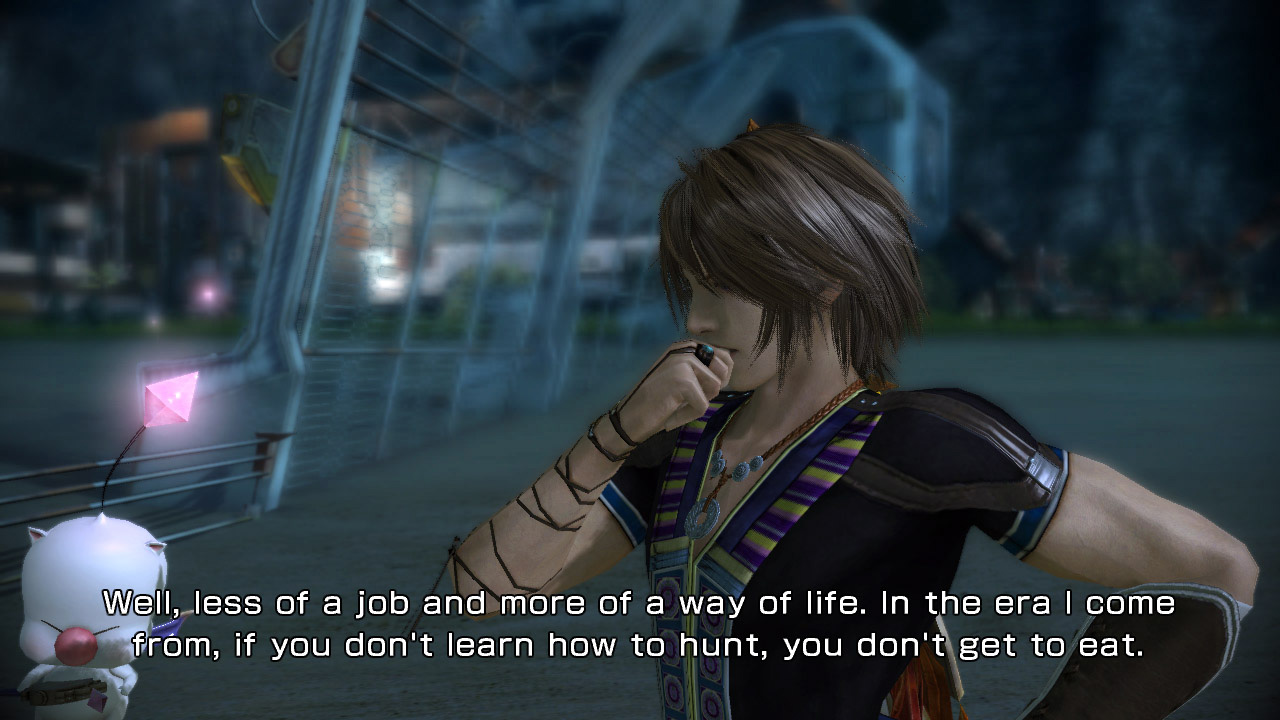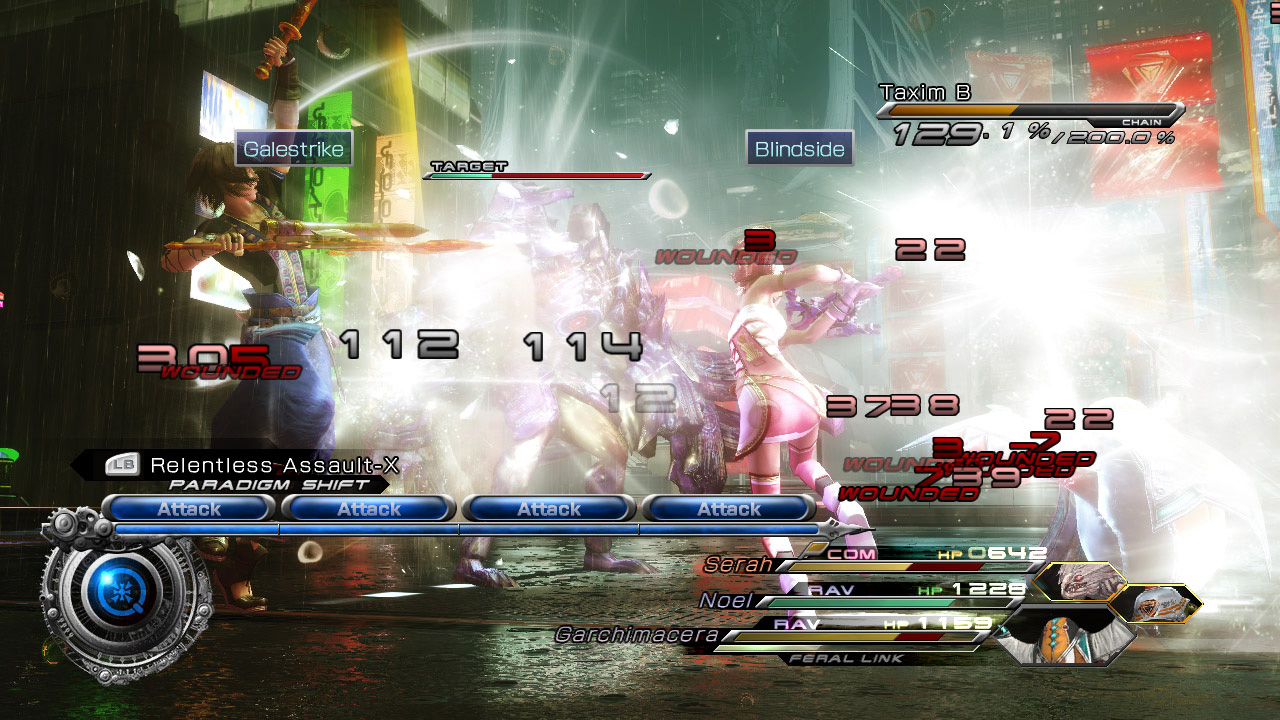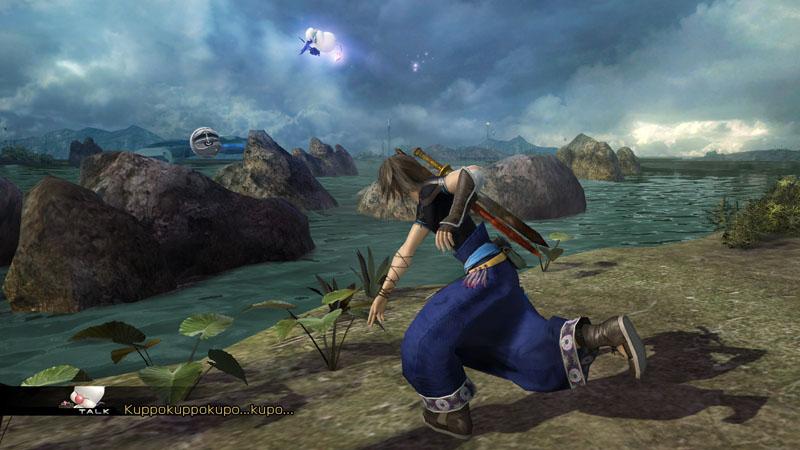Why you can trust GamesRadar+
So what about the story?
All this time travel relates directly to the story, which begins immediately after the final cutscene of FFXIII ends (and it goes without saying, but SPOILER ALERT FOR FFXIII). Fang and Vanille have summoned Ragnarok, creating a massive crystal pillar to keep Cocoon from crashing down. In the original ending, Lightning survived the near-cataclysmic event and was happily reunited with her sister Serah.
Above: Watch us play through some of the game
In FFXIII-2, the timeline has mysteriously changed, and everyone believes that Lightning perished in that battle. Only Serah remembers the truth, but even she questions her own sanity in the face of what all her friends believe to be reality. Then a stranger suddenly enters her life, a young man named Noel who claims he's from the future and has met Lightning in another dimension outside of normal space-time. Both want to alter the timeline – Serah wants to bring her sister back, and Noel wants to save humanity from the ends times he's seen with his own eyes. With their fates in alignment, they set out to change history.
As with any Final Fantasy game, it's difficult to write meaningfully about the story without spoiling anything. Where XIII created a fascinating mythos that revolved around the struggle between humans and demigods and the opposition between civilization and untamed wilderness, XIII-2's story is much more character driven. Serah and Noel are both surprisingly interesting and dynamic characters once you get past their over-the-top character designs.
It's a good thing too, because you won't be seeing much of anyone else for any extended length of time – Serah and Noel are really the only two main protagonists in the game. It's a bit of a shame, because the Final Fantasy series has excelled at creating some of the greatest ensemble casts in gaming, and being stuck with the same two party members for the entire game will definitely bother some people. If you can put your expectations of a larger party aside though, the extra time getting to know Serah and Noel isn't wasted, and makes them more memorable characters than most of the cast of XIII.

Above: The characters are less abundant, but arguably more likable
As you play through the story, one thing that's especially great about the "time gate" scenario is that it completely eliminates the break in reality that often comes from ignoring the narrative urgency of the main quest to explore and take on boatloads of sidequests. Because opening a time gate transports Serah and Noel to a specific moment in time, there's never a need for them to rush. Relax, explore, and when you're ready to take on the next big challenge, it'll be waiting for you, frozen in time until you hit play.
To battle!
If you're familiar with FFXIII, the core of the battle system in XIII-2 remains unchanged. While many traditional turn-based battle systems are all about micromanagement, the Paradigm system in XIII and XIII-2 puts the player in a high level, "big picture" role, if you will. Instead of selecting individual actions for each party member, you direct their actions all at once like an alpha dog issuing commands to the pack.
A Paradigm is a set of roles for the three party members that determines how each character functions in battle. Each role is extremely specific in what it can do – Medics can only provide healing and Commandos can only attack, nothing else. Each role also provides an added bonus to the entire team, like boosted defense for all allies when a Sentinel is in play.
Above: Take a look at the battle system in action
During battle you always have an active Paradigm in place, which you can change whenever you'd like by hitting L1/LB to bring up your Paradigm deck. Building a Paradigm deck with a variety of offensive and defensive Paradigms allows you to respond strategically to dynamic battle conditions. So you might go in guns blazing with a Commando-Ravager-Ravager set, then fall back to Commando-Ravager-Medic to heal as needed. Roles like Synergist (buffs allies with status enhancements) and Saboteur (debuffs the enemy with status ailments) come in particularly handy during long, brutal boss battles where you'll need every advantage you can conjure.
Most of the new "cinematic action" sequences occur during boss battles too, and these are really nothing more than quick time events. It's a feature that almost wouldn't be worth mentioning if it weren't so heavily touted in FFXIII-2's trailers – they're used fairly sparingly, kept brief, and are overall pretty unobtrusive. During particularly dramatic cutscenes, we definitely has a few moments where pulling off a flashy killing blow with a successful QTE definitely felt pretty cool (and we can imagine the opposite if we'd missed it at the end of a lengthy battle), but overall it's not a feature that's going to make or break anyone's enjoyment of the game.
One of the complaints about the battle system in FFXIII was that it "played itself," but this isn't exactly the case. When the difficulty ramps up, the battle system is a perfect mix of thoughtful strategy and quick reflexes. Directing your entire team's actions with the press of a button by shifting Paradigms on the fly still feels satisfying when everyone comes together to pull off a hard-won victory.

Above: Learning the combat system reveals the deep intricacies
The problem is, it's a system that's only as great as your opponent is. Too often in FFXIII-2, we played through lengthy stretches of the game where we just didn't feel challenged enough by the enemies. Often, we never had to shift Paradigms at all from our default offensive stance, and in those cases it does feel like the game is playing itself because very little action is needed from the player. The challenge is there if you seek out some of the tougher sidequests and go for better endings, but at times we definitely felt like the overall difficulty level was too low. Monsters definitely scale up in strength when you revisit earlier areas too, so it's a bit puzzling why they almost always didn't feel scaled up enough. Even total wimps should not think for one second about playing this game on the easy setting. Don't do it.
More info
| Genre | Role Playing |
| Description | If FFXIII was an exercise in form over function, its successor is exercise in working with what you've got and doing a brilliant job of it (for the most part). It does some things better than its predecessor, some things worse, but what's most impressive about Final Fantasy XIII-2 is how much feels new and different, despite sharing most of its guts with XIII. |
| Franchise name | Final Fantasy |
| UK franchise name | Final Fantasy |
| Platform | "Xbox 360","PS3" |
| US censor rating | "Teen","Teen" |
| UK censor rating | "Rating Pending","Rating Pending" |
| Alternative names | "FFXIII-2" |




